 |
|||||||||




 |
|||||||||





Stockholm, October 14, 2024 — The Royal Swedish Academy of Sciences has decided to award the Sveriges Riksbank Prize in Economic Sciences in Memory of Alfred Nobel 2024 to:
Daron Acemoglu
Massachusetts Institute of Technology, Cambridge, USA
Simon Johnson
Massachusetts Institute of Technology, Cambridge, USA
James A. Robinson
University of Chicago, IL, USA
“for studies of how institutions are formed and affect prosperity.”
“They have helped us understand differences in prosperity between nations.”
The 2021 laureates in economic sciences, Daron Acemoglu, Simon Johnson, and James Robinson, have highlighted the significance of societal institutions in determining a country’s prosperity. Their research emphasizes that societies with weak rule of law and exploitative institutions struggle to foster economic growth and positive transformation.
When Europeans colonized large parts of the globe, the institutions in those societies changed. This change was sometimes dramatic, but it did not occur the same way everywhere. In some places, the goal was to exploit the indigenous population and extract resources for the colonizers’ benefit. In other areas, the colonizers established inclusive political and economic systems for the long-term benefit of European migrants.
Research conducted by Nobel laureates has highlighted the impact of societal institutions established during colonization on countries’ prosperity. They found that implementing inclusive institutions in poorer colonized nations contributed to long-term prosperity. This insight helps us understand why some previously wealthy colonies are now impoverished and vice versa.
In some countries, the presence of extractive institutions and low economic growth presents a challenge. Transitioning to inclusive institutions would bring about long-term benefits for everyone. However, the short-term gains provided by extractive institutions often serve the interests of those in power. As long as the political system guarantees their continued control, it’s difficult for people to trust promises of future economic reforms. According to the laureates, this lack of trust is a significant obstacle to improvement.
In times of potential revolution, those in power face a challenging decision. While they may initially attempt to appease the public with promises of economic reforms, the lack of credibility in these promises can ultimately lead to the establishment of democracy as the most viable solution.
“Reducing the significant income disparities between nations is one of the most pressing challenges of our time. The laureates have highlighted the crucial role of societal institutions in addressing this issue,” stated Jakob Svensson, Chair of the Committee for the Prize in Economic Sciences.
Source: The Royal Swedish Academy of Sciences
|GlobalGiants.Com|
Edited & Posted by the Editor | 11:06 AM | View the original post

Bisleri, a packaged drinking water seller, is setting up a Plastic Waste Material Recovery Facility at the Panjab University Campus in Chandigarh.

Photo: Mr. Angelo George of Bisleri International Pvt. Ltd. and Prof. (Dr.) Yajvender Pal Verma, Registrar of Panjab University, exchanged documents to establish Bisleri’s on-campus Plastic Waste Material Recovery Facility. Bisleri will provide a dedicated vehicle to collect plastic waste regularly from Panjab University and Chandigarh City and transport it to its Plastic Waste Facility at PU for subsequent recycling.
Chandigarh, India, September 16, 2024 — Packaged drinking water seller Bisleri has launched its campus activities at Panjab University, Chandigarh. These activities will operate under Bisleri’s Corporate Social Responsibility initiative, ‘Bottles for Change.’
The occasion, marking the culmination of a collaborative initiative that commenced in September 2023, encompassed the formalization of a Memorandum of Understanding (MoU) to establish Bisleri’s Plastic Waste Material Recovery Facility on the PU campus, representing a significant stride toward sustainability. Over 300 zealous students participated, convening to bolster sustainable practices and recycling endeavors within the campus environment.
Prof. (Dr.) Renu Vig, Vice-Chancellor of Panjab University, Prof. (Dr.) Yajvender Pal Verma, Registrar of Panjab University, and Mr. Angelo George of Bisleri International Pvt. Ltd. attended the event.
Mr. Angelo George, representing Bisleri International, expressed, “Our partnership with Panjab University highlights the potential of young intellectuals in advancing sustainable progress. Through the ‘Bottles for Change’ initiative, we aim to foster a movement that promotes conscientious plastic usage and disposal. The enthusiastic involvement and dedication displayed by students and faculty is immensely heartening, and we are eager to continue on this path towards a more environmentally friendly future.”
Key highlights of the event included:
The MoU signing for establishing Bisleri’s on-campus Plastic Waste Material Recovery Facility at the PU campus.
Bisleri will install used plastic collection banks at strategic places on the university campus to encourage responsible disposal and recycling.
Bisleri will arrange for a dedicated vehicle to collect plastic waste regularly from Panjab University and Chandigarh City and transport it to its Plastic Waste Material Recovery Facility at Panjab University.
Bisleri also formally established an agreement with Esperanza, Chandigarh’s designated recycling partner. This collaboration will streamline the processing and recycling of used plastic stored at the PU Plastic Waste Material Recovery Facility and various used plastic collection banks on the PU campus.
The occasion also signified the introduction of a specialized vehicle for the regular collection of plastic waste from both the Panjab University and Chandigarh City. The vehicle, provided by Bisleri, will deposit the collected waste in the PU On-Campus Plastic Waste Material Recovery Facility for subsequent transportation and recycling.
Professor (Dr.) Renu Vig, Vice Chancellor of Panjab University, emphasized the initiative’s significance and remarked, “Instilling sustainable values in our students is crucial, as they are the future leaders who will shape our world. Panjab University is committed to playing a pivotal role in this environmental movement, ensuring that our campus serves as a model of sustainability.”
So, it is fantastic news for the Residents of Chandigarh!
Instead of throwing plastic waste in their garbage bins, Chandigarh Residents can contribute to environmental conservation and community engagement by donating it to Bisleri’s Used Plastic Collection Facility at the Panjab University Campus!
Bisleri International Pvt. Ltd boasts a rich legacy spanning over 54 years and is one of India’s foremost premium beverage enterprises. Renowned for producing Bisleri, the nation’s leading packaged drinking water, the company adheres to a rigorous process encompassing 114 quality assessments and a 10-stage purification system. This unwavering commitment ensures the delivery of pure, safe, and healthy water to consumers.
Bisleri International maintains a substantial market presence with 128 operational plants and a well-established distribution network encompassing over 6,000 Distributors and 7,500 Distribution Trucks throughout India.
The company’s core values focus on achieving growth and sustainability while being responsible in all aspects of the business. Bisleri International has launched Sustainability 2.0 with Bisleri Greener Promise, which aims to create a greener future through recycling, water conservation, and sustainability initiatives.
Source: Bisleri International Pvt. Ltd.
Edited & Posted by the Editor | 2:26 AM | View the original post

• NAAC Update on Binary Accreditation of Universities and Colleges in India.
Chandigarh, India, September 3, 2024 —The National Assessment and Accreditation Council (NAAC) in India is currently undergoing reforms in accordance with the recommendations outlined by a high-powered committee instituted by the Ministry of Education.
The high-powered committee has recommended implementing an uncomplicated, trust-based, credible, objective, and standardized system for approving, accrediting, and ranking Higher Education Institutions (HEIs).
Further, the High-Powered Committee has recommended that all HEIs (higher education institutions), i.e., Universities and Colleges, participate in the new accreditation system.
The National Assessment and Accreditation Council (NAAC) will introduce reformation in two distinct phases: Binary Accreditation Framework (BAF) and Maturity-Based Graded Levels (MBGL). Furthermore, NAAC will ensure a seamless transition.
In light of this development, the National Assessment and Accreditation Council (NAAC) issued a significant notification addressed to all higher education institutions (HEIs) in India. For comprehensive information, we direct your attention to our recent news article, “NAAC Accreditation: Important Announcement for All Higher Education Institutions in India,” published on our other website, CitiTimes.Com, dated August 25, 2024.
• The latest update from NAAC is as follows:
Universities and colleges that have communicated with NAAC requesting to shift from the existing Revised Accreditation Framework (RAF) to the Binary Accreditation Framework (BAF) following the NAAC Reforms Announcement should await the procedural details that NAAC will soon issue. These procedural details will be available on the NAAC website.
Higher Education Institutions (HEIs) currently undergoing Assessment and Accreditation (A&A) by the National Assessment and Accreditation Council (NAAC) within the Revised Accreditation Framework (RAF) have the option to choose Binary Accreditation. They are required to communicate this decision to NAAC for further necessary steps.
Source: NAAC
Edited & Posted by the Editor | 4:37 AM | View the original post

Photo: Students from Universidad Catolica Boliviana prepare to traverse the course at the 2024 Human Exploration Rover Challenge (HERC) at the U.S. Space & Rocket Center in Huntsville, Alabama, near NASA’s Marshall Space Flight Center. Photo Credits: NASA/Taylor Goodwin.
WASHINGTON, April 22, 2024 — NASA has announced the winners of the 30th Human Exploration Rover Challenge (HERC). Parish Episcopal School from Dallas won the high school division, and the University of Alabama in Huntsville captured the college/university title.
The annual engineering competition is one of NASA’s longest-standing challenges and was held on April 19-20 at the U.S. Space & Rocket Center in Huntsville, Alabama, near NASA’s Marshall Space Flight Center. The complete list of 2024 award winners appears below:
High School Division
College/University Division
Ingenuity Award
Phoenix Award
Task Challenge Award
Project Review Award
Featherweight Award
Safety Award
Crash and Burn Award
Jeff Norris and Joe Sexton Memorial Pit Crew Award
Team Spirit Award
Most Improved Performance Award
Social Media Award
STEM Engagement Award
Artemis Educator Award
Rookie of the Year
More than 600 students from 72 teams worldwide participated in the Human Exploration Rover Challenge (HERC), which celebrated its 30th anniversary as a NASA competition. Participating teams represented 42 colleges and universities and 30 high schools from 24 states, the District of Columbia, Puerto Rico, and 13 other nations worldwide. Teams were awarded points based on navigating a half-mile obstacle course, conducting mission-specific task challenges, and completing multiple safety and design reviews with NASA engineers.
“This student design challenge encourages the next generation of scientists and engineers to engage in the design process by providing innovative concepts and unique perspectives,” said Vemitra Alexander, HERC activity lead for NASA’s Office of STEM Engagement at Marshall. “While celebrating the 30th anniversary of the challenge, HERC also continues NASA’s legacy of providing valuable experiences to students who may be responsible for planning future space missions, including crewed missions to other worlds.”
HERC is one of NASA’s eight Artemis Student Challenges reflecting the goals of the Artemis program, which seeks to land the first woman and first person of color on the Moon while establishing a long-term presence for science and exploration. NASA uses such challenges to encourage students to pursue degrees and careers in science, technology, engineering, and mathematics.
HERC is managed by NASA’s Southeast Regional Office of STEM Engagement at Marshall. Since its inception in 1994, more than 15,000 students have participated in HERC - with many former students now working at NASA or within the aerospace industry.
SOURCE: NASA
|GlobalGiants.Com|
2024 Human Exploration Rover Challenge Participating Teams
Edited & Posted by the Editor | 5:17 AM | View the original post
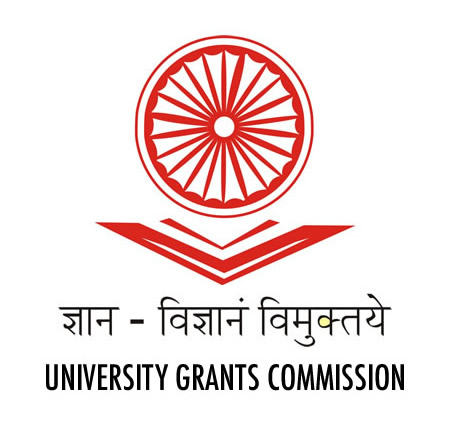
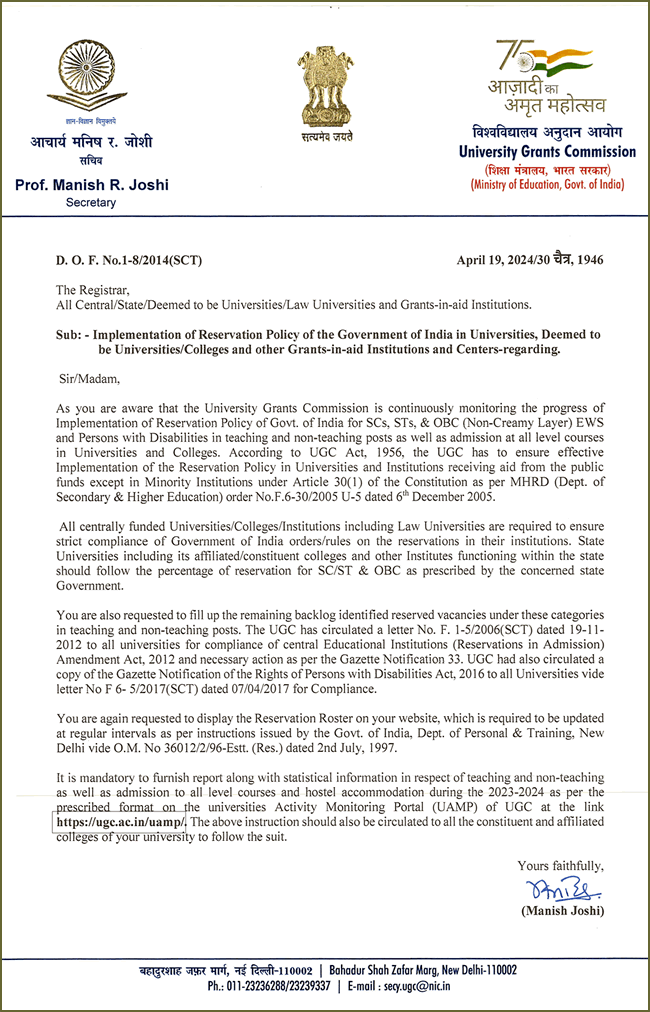
Photo: The UGC directive to the Registrars of publicly funded universities, including the Registrar of Panjab University in Chandigarh.
The University Grants Commission (UGC) has instructed the Registrars of publicly funded universities, including the Registrar of Panjab University in Chandigarh, to strictly follow the Government of India’s Reservation Rules for Scheduled Castes (SC), Scheduled Tribes (ST), and Other Backward Classes (OBC) in all teaching and non-teaching posts, as well as student admissions in all courses.
Moreover, these Registrars must submit their Compliance Report through the “University Activity Monitoring Portal” of the UGC.
Source: UGC
|GlobalGiants.Com|
— The Editor is a Higher Education Professional.
Edited & Posted by the Editor | 1:11 AM | View the original post
— UPDATED —
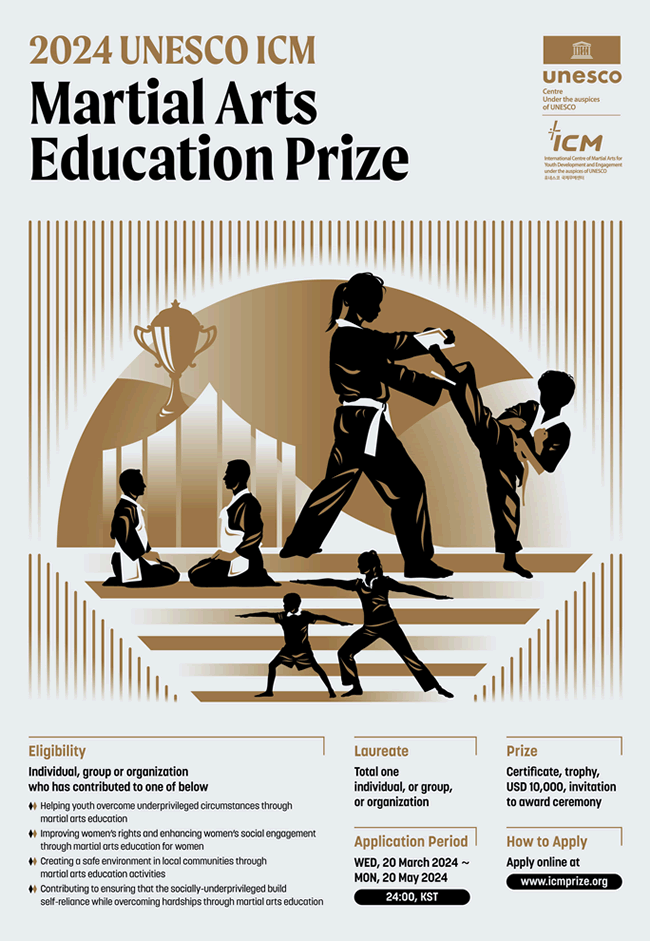
The International Centre of Martial Arts for Youth Development and Engagement (ICM), under the auspices of UNESCO, has announced the opening of the call for the 2024 UNESCO ICM Martial Arts Education Prize.
Applications are Open from March 20 to May 20, 2024 (Korea Standard Time). Individuals, groups, or organizations significantly contributing to martial arts education and social development, including youth and women’s empowerment, may apply for the prize.
The prize aims to acknowledge and support exceptional martial arts education initiatives globally.
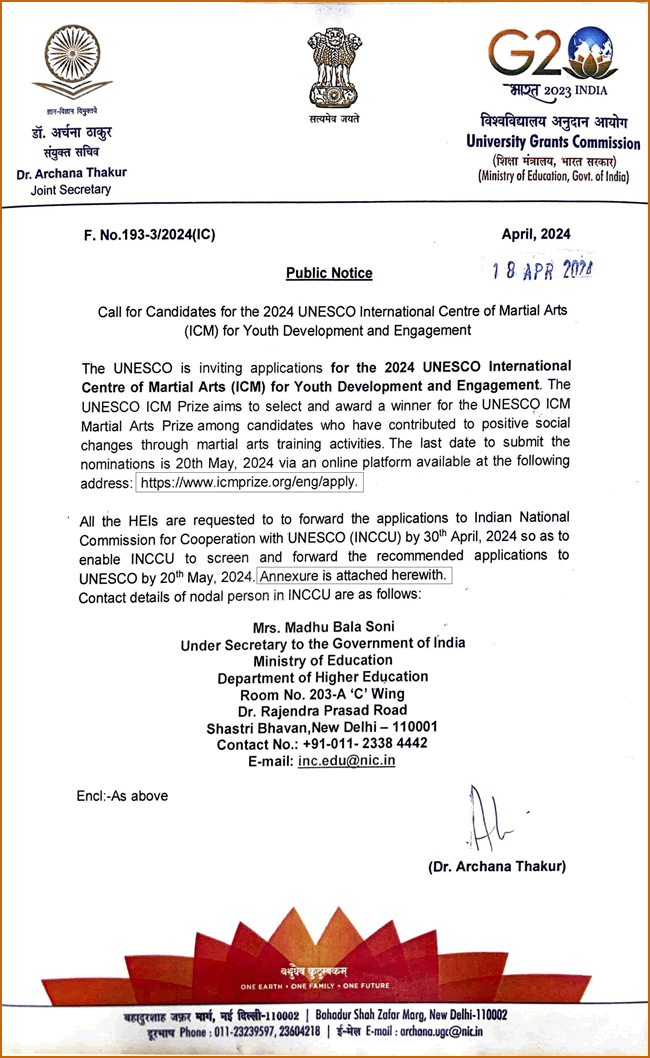
Applications from India should be delivered to the Indian National Commission for Cooperation with UNESCO (INCCU), Government of India, Ministry of Education, Department of Higher Education, no later than April 30, 2024, for further consideration and onward transmission to UNESCO Headquarters, Paris, France.
Sources: UGC; Indian National Commission for Cooperation with UNESCO (INCCU), Government of India, Ministry of Education, Department of Higher Education.
|GlobalGiants.Com|
Edited & Posted by the Editor | 4:05 AM | View the original post
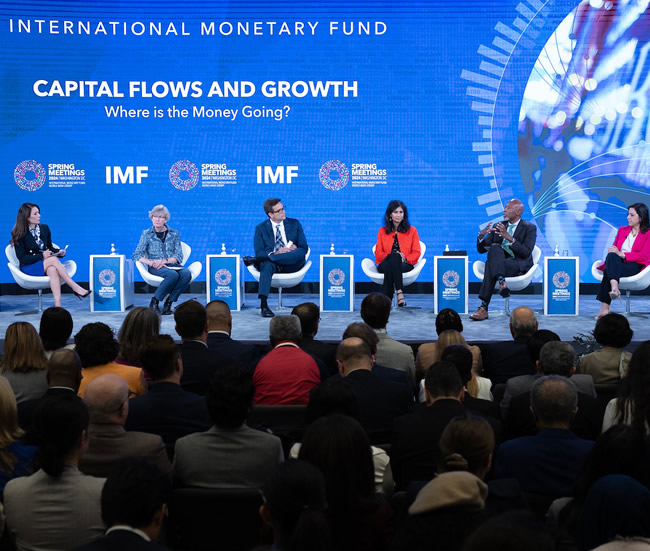
Photo: A panel of esteemed figures in global finance and Economics, including CNBC anchor Karen Tso, Bank of England External Member Catherine Mann, Central Bank of Brazil Governor Roberto Campos Neto, First Deputy Managing Director of IMF Gita Gopinath, South African Reserve Bank Governor Lesetja Kganyago, and University of Maryland Professor of Economics Sebnem Kalemli-Ozcan, engage in a thought-provoking seminar on ‘Capital Flows and Growth: Where is the Money Going?’ This event occurred during the 2024 Spring Meetings of the World Bank Group and International Monetary Fund in Washington on April 19, 2024. IMF Photo/Tom Brenner. IMF Photo/ Tom Brenner. Image provided by & copyright © IMF.
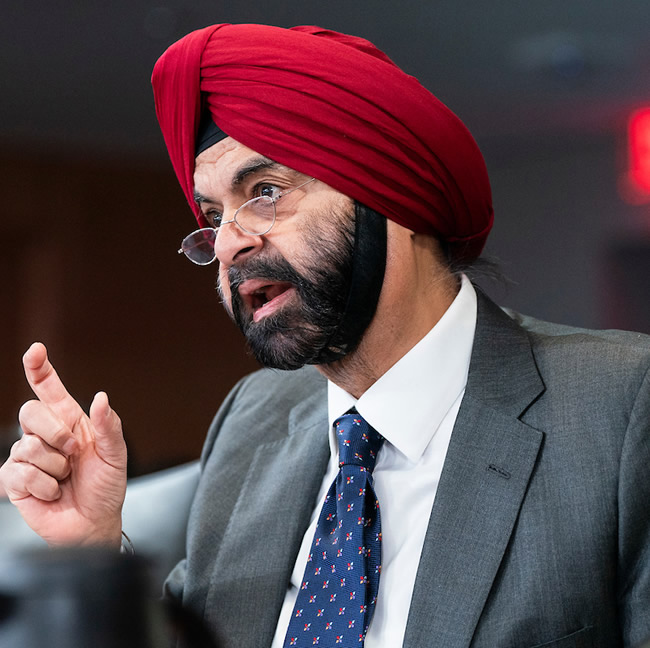
Photo: World Bank President Ajay Banga addresses the assembly at the G24 Finance Ministers and Central Bank Governors Meeting, a crucial gathering of global financial leaders, at the 2024 Spring Meetings of the World Bank Group and International Monetary Fund in Washington, DC, on April 16, 2024. IMF Photo / Joshua Roberts. Image provided by & copyright © IMF.
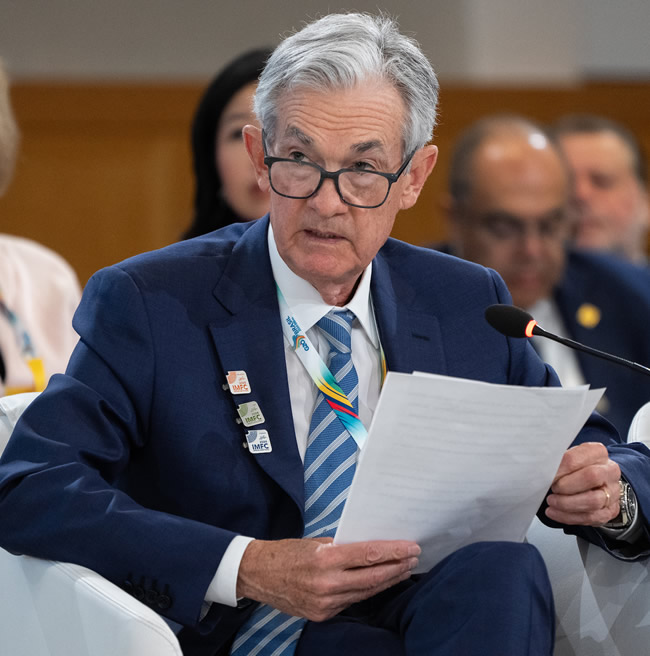
Photo: The Chair of the US Federal Reserve, Jerome Powell, speaks at the IMFC (International Monetary and Financial Committee) Plenary Session during the 2024 Spring Meetings of the World Bank Group and International Monetary Fund in Washington, DC, on April 19, 2024. IMF Photo / James Mertz. Image provided by & copyright © IMF.
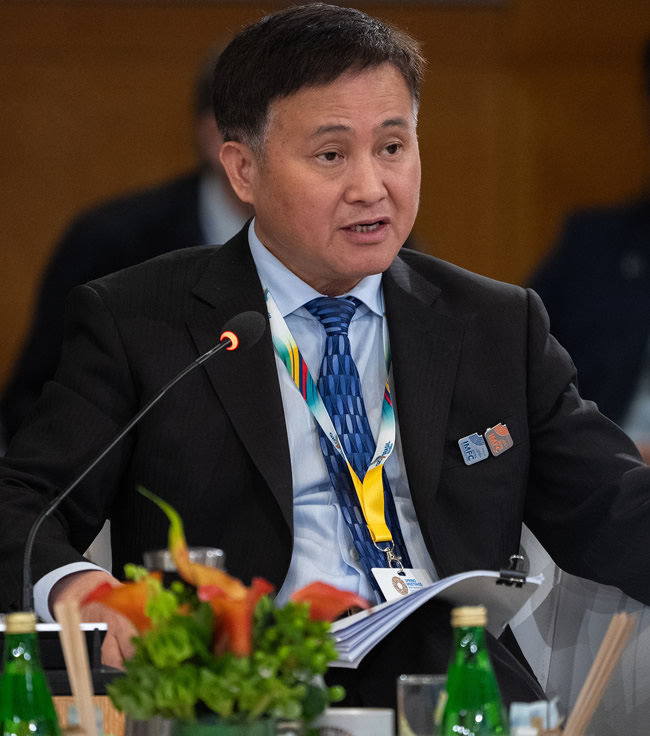
Photo: The People’s Bank of China Governor, Pan Gongsheng, speaks at the IMFC (International Monetary and Financial Committee) Plenary Session during the 2024 Spring Meetings of the World Bank Group and International Monetary Fund in Washington, DC, on April 19, 2024. IMF Photo / James Mertz. Image provided by & copyright © IMF.
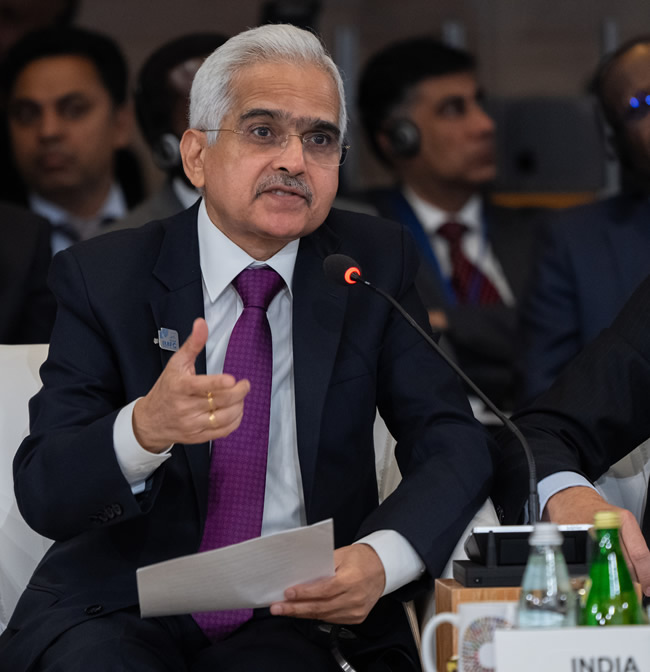
Photo: The Governor of the Reserve Bank of India, Shaktikanta Das, speaks at the IMFC (International Monetary and Financial Committee) Plenary Session during the 2024 Spring Meetings of the World Bank Group and International Monetary Fund in Washington, DC, on April 19, 2024. IMF Photo/James Mertz. Image provided by & copyright © IMF.
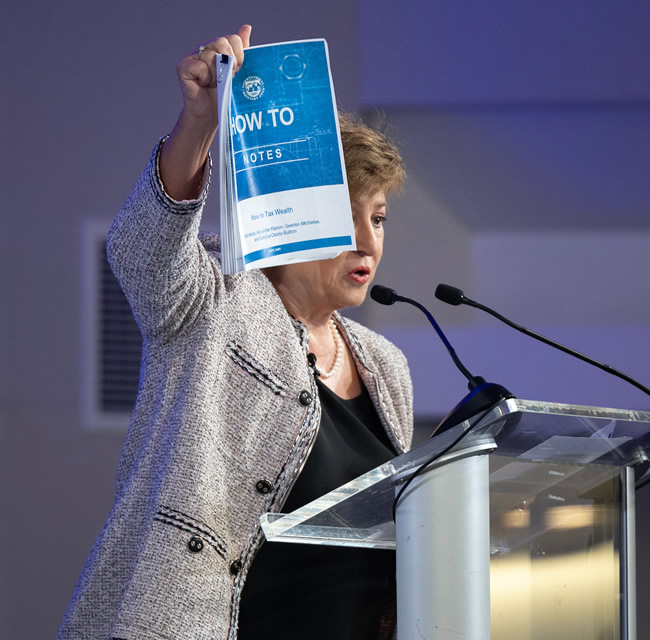
Photo: IMF Managing Director Kristalina Georgieva speaks at the G20 Event “Taxing the super-rich: New Challenges in International Taxation” during the 2024 Spring Meetings of the World Bank Group and International Monetary Fund in Washington, DC, on April 17, 2024. IMF Photo / Tom Brenner. Image provided by & copyright © IMF.
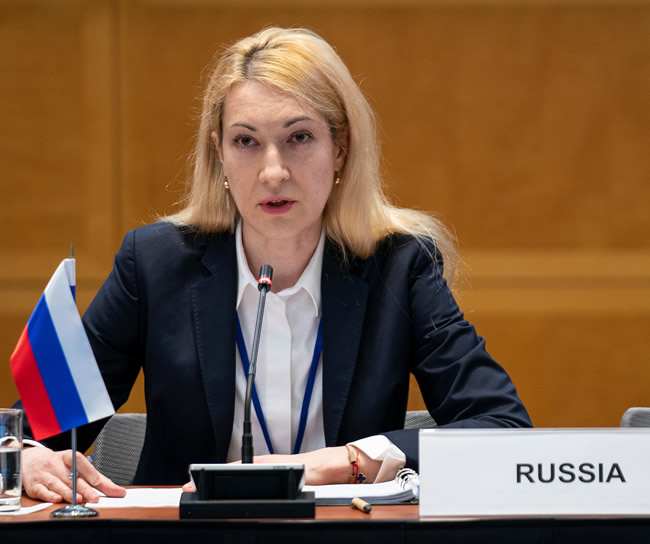
Photo: Gulnara Khaydarshina, director of the Department of Cooperation with International Organizations of the Bank of Russia, addresses the other delegates at the BRICS Finance Ministers and Central Bank Governors Deputies’ Meeting during the 2024 Spring Meetings of the World Bank Group and International Monetary Fund in Washington, DC, on April 16, 2024. IMF Photo / Sarah Silbiger. Image provided by & copyright © IMF.
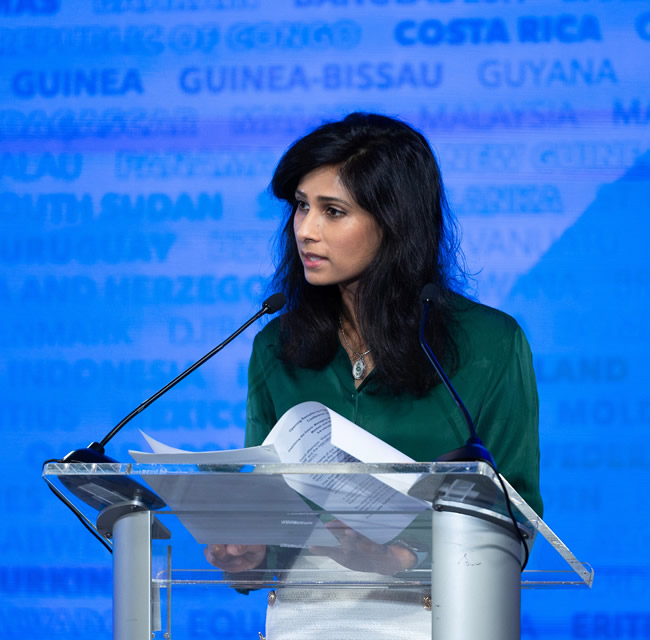
Photo: IMF’s First Deputy Managing Director, Gita Gopinath, delivers remarks at the 1st IMF-IOSCO (International Organization of Securities Commissions) Conference during the 2024 Spring Meetings of the World Bank Group and International Monetary Fund in Washington, DC, on April 15, 2024. IMF Photo / Tom Brenner. Image provided by & copyright © IMF.
Source: IMF
|GlobalGiants.Com|
— The editor holds an IMF Washington, DC academic certification.
Edited & Posted by the Editor | 8:03 AM | View the original post
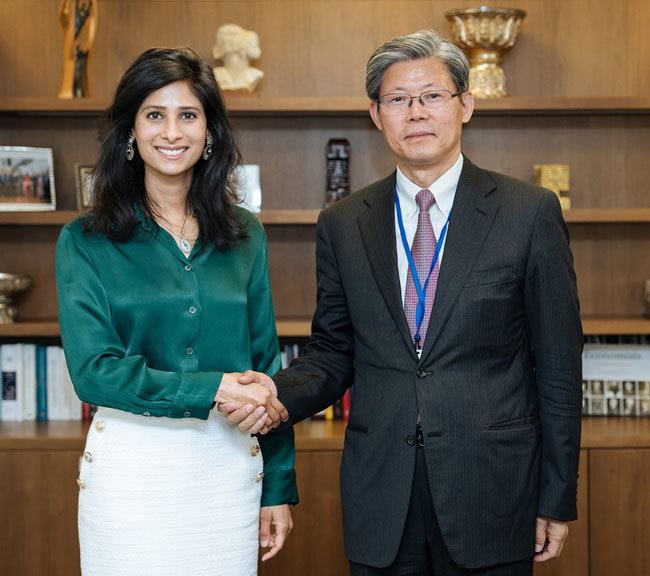
Photo: First Deputy Managing Director of IMF, Gita Gopinath, holds a bilateral meeting with Changneng Xuan, deputy governor of the National Bank of China, during the 2024 Spring Meetings of the World Bank Group and International Monetary Fund in Washington, DC, on April 15, 2024. IMF Photo / Lewis Joly. Image provided by & copyright © IMF.
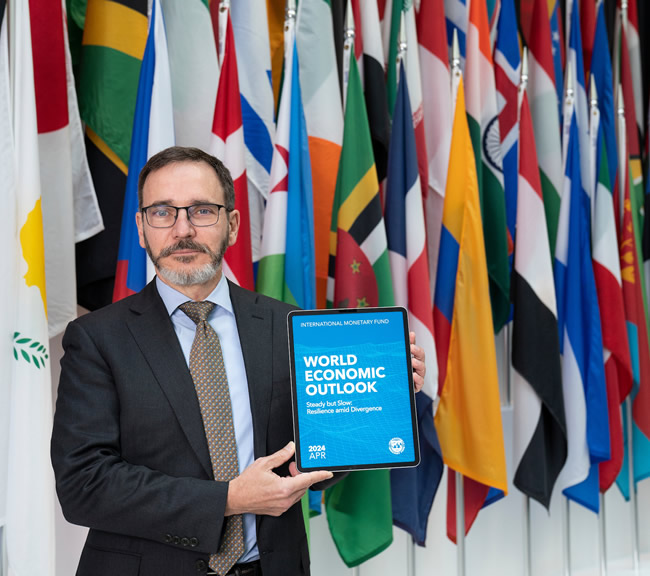
Photo: Director of the Research Department at IMF, Pierre-Olivier Gourinchas, poses with the April 2024 World Economic Outlook during the 2024 Spring Meetings of the World Bank Group and International Monetary Fund in Washington, DC, April 16, 2024. IMF Photo / Sarah Silbiger. Image provided by & copyright © IMF.
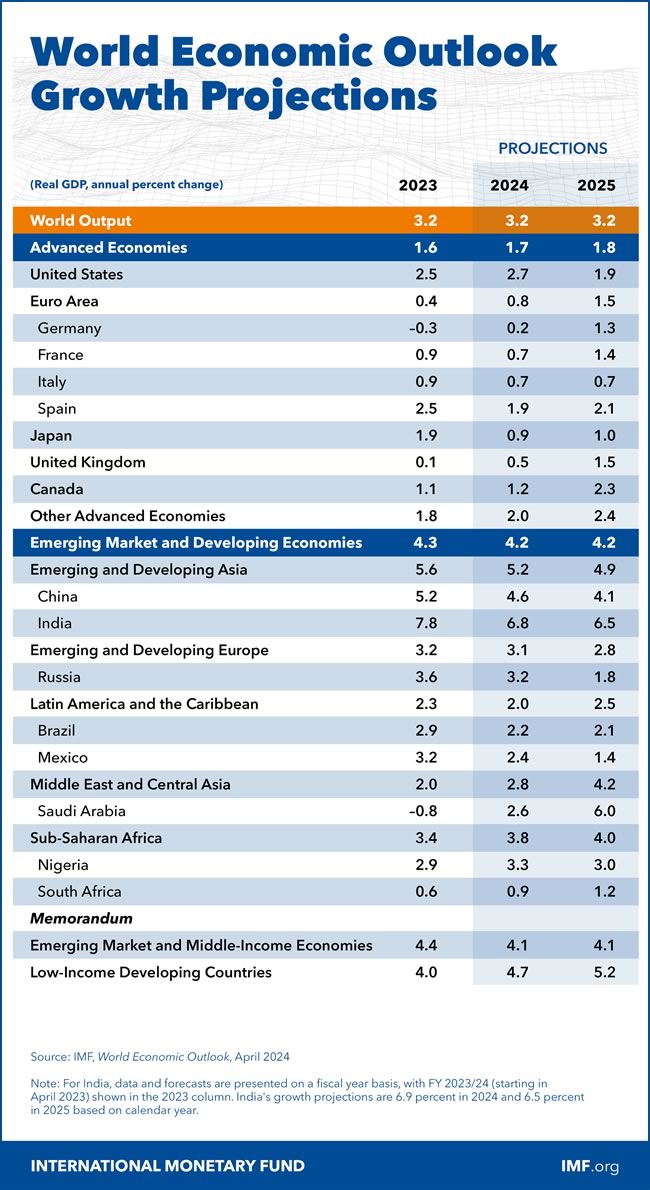
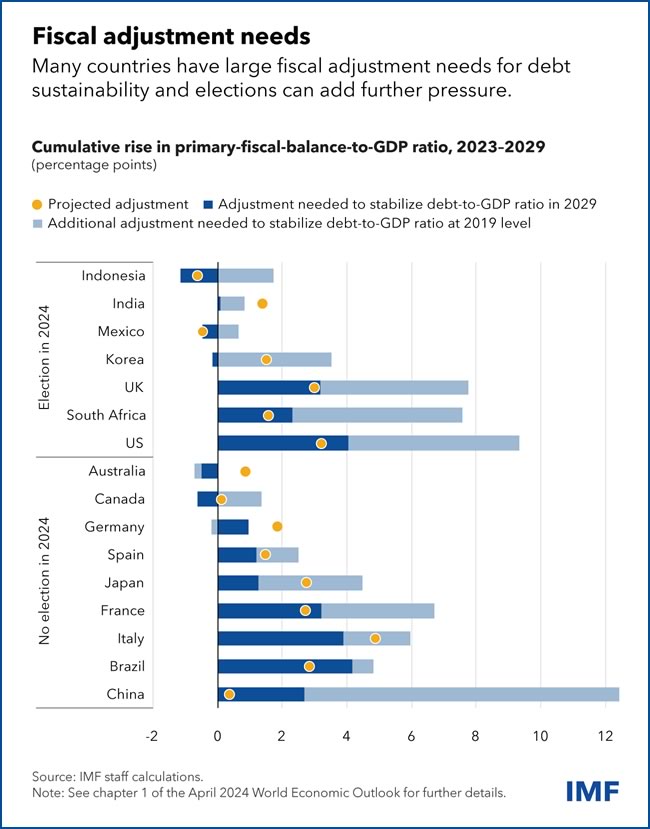
Washington, DC, April 16, 2024 — On Tuesday, the IMF released its World Economic Outlook for April 2024, with some positive news to report. The global economy is projected to continue growing steadily at a rate of 3.2% in 2024 and 2025, which aligns with 2023’s growth rate. While this is slightly below the historical average of 3.8%, it’s still a positive sign of continued economic activity. Additionally, global headline inflation is expected to decrease from an average of 6.8% in 2023 to 5.9% in 2024 and then further to 4.5% in 2025.
Since October 2023, the global economic landscape has seen a reduction in risks, leading to a more balanced distribution of potential outcomes around the baseline projection for international growth. However, it’s important to note the potential upsides that could further boost the economy. These include fiscal policy proving to be more expansionary than expected or advancements in artificial intelligence boosting productivity, offering a glimmer of hope for a more prosperous future.
Overall, the IMF’s chief economist, Pierre-Olivier Gourinchas, underscored the need for smooth inflation convergence to target levels and rebuilding fiscal buffers to guard against future shocks. Additionally, intensifying supply-enhancing reforms would facilitate inflation and debt reduction while allowing economies to increase growth toward higher pre-pandemic averages. However, the most pressing call is for world leaders to strengthen multilateral cooperation. It is not just a suggestion but a necessity to make progress on common goals such as climate change and mitigate the costs of geoeconomic fragmentation.
Source: IMF
|GlobalGiants.Com|
Edited & Posted by the Editor | 12:19 PM | View the original post

WASHINGTON, DC, April 15, 2024 — Nobel Prize-winning economist Joseph Stiglitz will release the findings of a new study on the relationship between press freedom and advancing democratic values and economic development at a National Press Club Headliners Coffee and Conversation at 11 a.m. on Wednesday, April 17 in the First Amendment Lounge.
Stiglitz’s remarks will be followed by a panel discussion of the report with esteemed experts in the field, Arturo Herrera Gutierrez, global director for Governance Global Practice in the Equitable Growth, Finance, and Institutions Practice Group at the World Bank, and Eliot Minchenberg, Director of Office and UNESCO Representative to the United Nations in New York. The study is part of UNESCO’s “World Trends in Freedom of Expression and Media Development” series.
Doors open at 10:30 a.m. with coffee provided.
Registration is a prerequisite to attending this event, so please register to confirm your attendance.
Source: National Press Club
|GlobalGiants.Com|
— The editor is a National Press Club member.
Edited & Posted by the Editor | 8:55 AM | View the original post
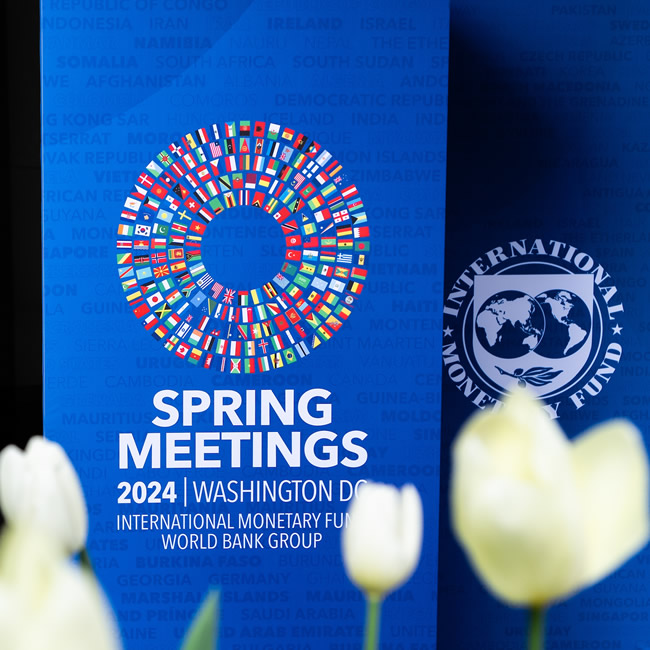
Photo: Promotional signage goes up ahead of the 2024 Spring Meetings of the International Monetary Fund (IMF) and the World Bank Group (WBG) in Washington, DC., April 5, 2024. IMF Photo / James Mertz. Image provided by & copyright © IMF.
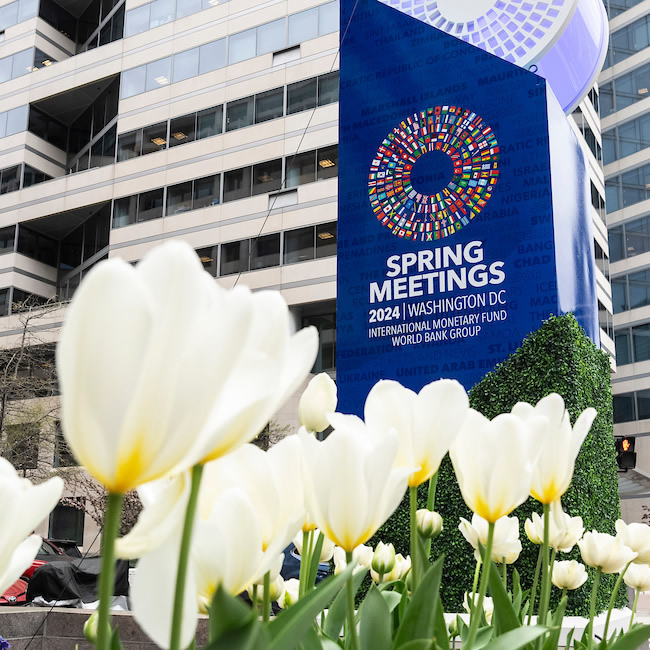
Photo: Preparation for the Spring Meetings at the International Monetary Fund in Washington, D.C., April 11, 2024. IMF Photo/Joshua Roberts. Image provided by & copyright © IMF.
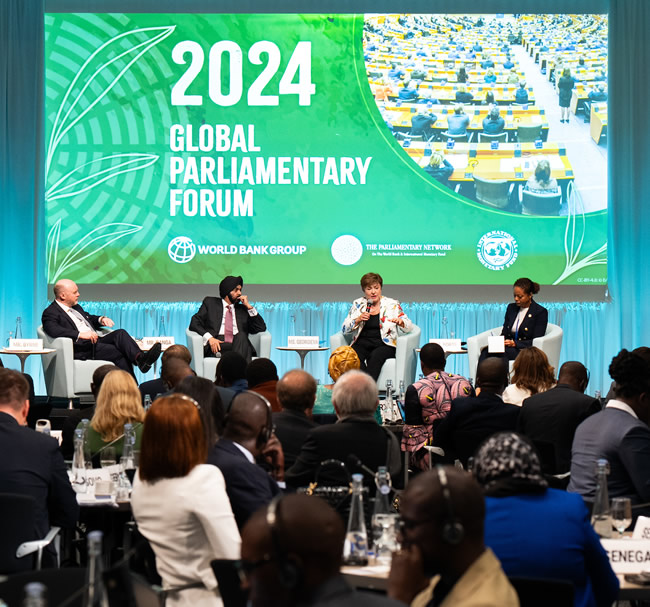
Photo: IMF Managing Director Kristalina Georgieva, World Bank President Ajay Banga, UK MP and Chair of Business and Trade Liam Byrne, and Jamaican MP and Minister of Legal and Constitutional Affairs Marlene Forte at the Global Parliamentary Forum during the 2024 Spring Meetings of the World Bank Group and International Monetary Fund in Washington, DC, April 15, 2024. IMF Photo / James Mertz. Image provided by & copyright © IMF.

Photo: International Monetary Fund (IMF) and the World Bank Group (WBG) Spring Meetings 2024 Calendar provided by the IMF.
The upcoming IMF and World Bank Spring Meetings, a significant event in the global financial calendar, will take place next week in Washington, DC. Financial leaders worldwide will convene to discuss various critical issues that directly impact people’s lives. These issues include inflation, the economic ramifications of the conflicts in Gaza and Ukraine, and the effects of artificial intelligence on the global economy.
It’s important to note that the G20 Finance meetings, led by Brazil this year, will also be held concurrently with the Spring Meetings.
The Spring Meetings, a platform for diverse perspectives, are an annual event that brings together central bankers, development and finance ministers, parliamentarians, private sector executives, representatives from civil society organizations, and academics. They gather to discuss global issues such as economic outlook, poverty eradication, economic development, and aid effectiveness. The event will feature seminars, regional briefings, press conferences, and other activities focused on the world’s financial system, international development, and the global economy. The central ministerial meetings and events will occur from April 17-19, with other events and activities taking place throughout the week from April 15-20.
Source: IMF
|GlobalGiants.Com|
— The editor is an IMF-certified Financial Market Analyst.
Edited & Posted by the Editor | 12:33 PM | View the original post

Academic calendars are not just a set of dates but the backbone of Higher Education Institutions (HEIs). They enable universities to meticulously plan and execute educational activities, ensuring students receive a quality education. The University Grants Commission (UGC) has issued guidelines for universities to follow when creating academic calendars, which include specific timelines for different courses’ commencement of classes and the declaration of results.
Moreover, universities must announce their academic calendar at the beginning of each academic year, including all educational activities and dates for degree awards. By complying with these guidelines, HEIs can promote quality teaching, learning, and research.
Therefore, the UGC has asked all HEIs to adhere to the timelines prescribed by the UGC or the relevant Statutory Regulatory Councils, where applicable.
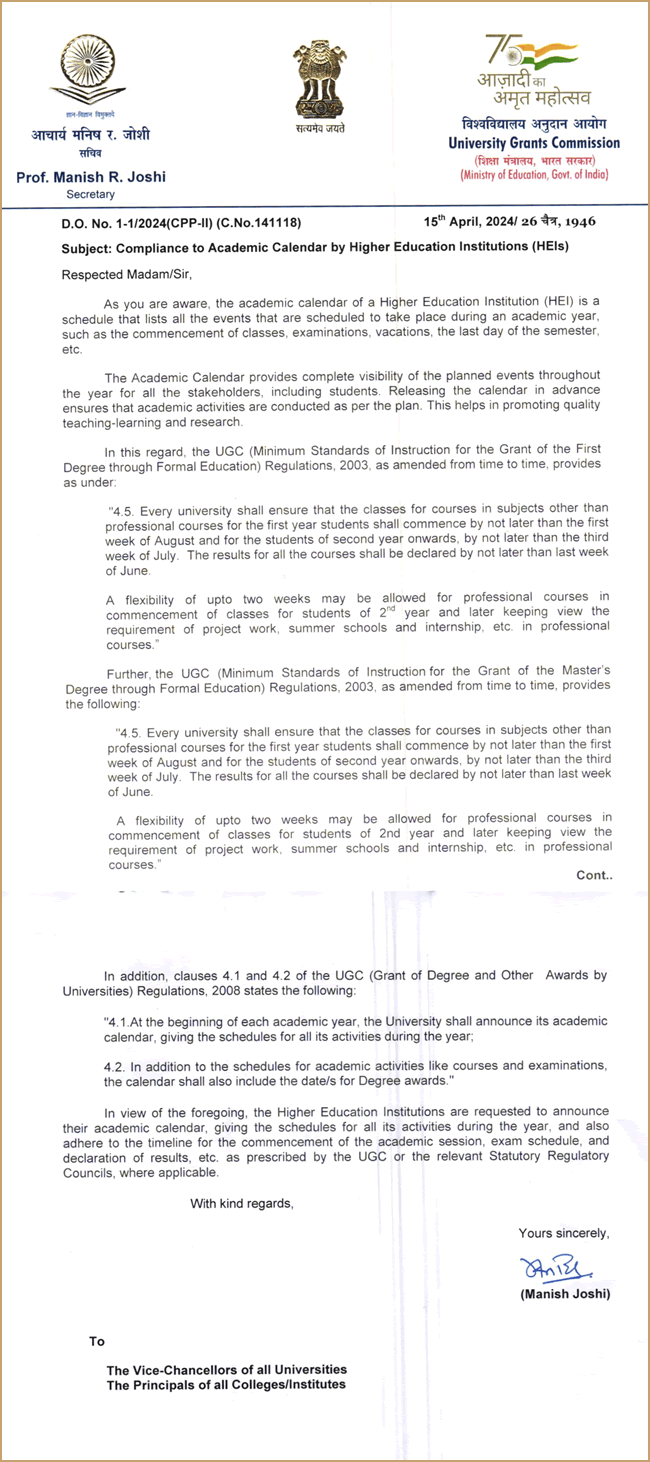
Photo: The University Grants Commission has asked universities to announce their academic calendar in compliance with the UGC (Grant of Degree and Other Awards by Universities) Regulations, 2008.
Source: UGC
|GlobalGiants.Com|
Edited & Posted by the Editor | 8:33 AM | View the original post
- QS reveals Top universities in 55 subjects.
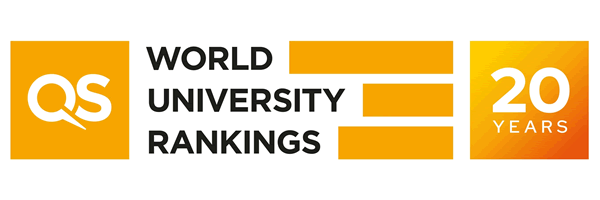
LONDON, April 10, 2024 — Global higher education analyst QS Quacquarelli Symonds released the fourteenth edition of the QS World University Rankings by Subject: an independent comparative analysis of academic excellence featuring 1500+ universities in 96 countries and territories across 55 disciplines.
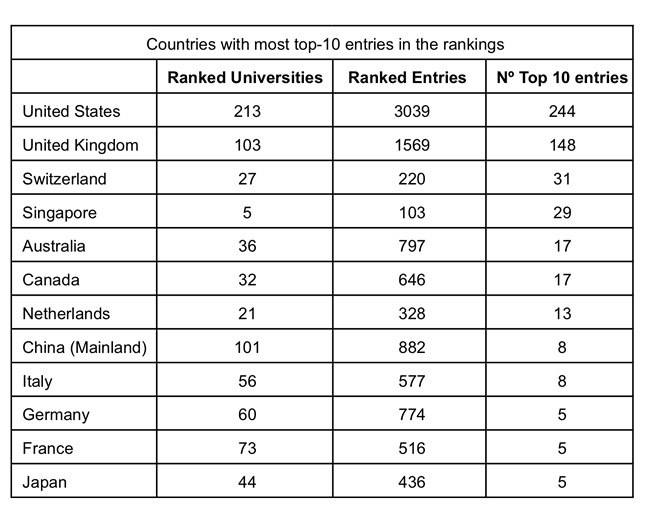
• Global Highlights
US universities lead in 32 subjects, with Harvard University being the world’s strongest-performing institution, ranking first in 19 disciplines. Following Harvard closely is MIT, which leads in 11 subjects.
On the other hand, UK institutions lead in 16 subjects, with the University of Oxford topping in four, followed by the University of Cambridge, UCL, Royal College of Art, and Royal College of Music with two each.
Switzerland boasts the highest concentration of #1 entries (4) proportionally to its ranked universities, with ETH Zurich leading in three subjects, making it the most vital institution in Continental Europe.
Australia’s universities in Melbourne and Sydney have 53 and 52 of the world’s top 100 subjects, respectively.
France is the most internationally collaborative research hub, with 23 entries among the top 10 for the International Research Network.
Japan has reversed its five-year decline, with 26% of its previously ranked entries climbing, 21% dropping, and 42% remaining stable—an overall improvement of 5%.
China is the third most represented country, ranking in the top 10 for eight subjects. Tsinghua University achieves its three highest ranks, including the top performer, History of Art (5th).
India’s ranked entries and overall performance have soared by 19% and 17%, respectively.
Brazil is the most represented country in Latin America and among the top 100. Meanwhile, Mexico boasts the region’s most top-20 entries (4).
Saudi Arabia’s KFUPM offers the Arab Region’s highest-ranked programs: Petroleum Engineering (5th) and Mineral and Mining Engineering (8th).
Cape Town University leads Africa and ranks 15th globally in Development Studies.
QS Senior Vice President Ben Sowter said: With rising global inflation, geo-political instability, and general elections in 50+ countries, supporting higher education and international student mobility has never been more critical as it drives innovation and societal advancement. QS’s extensive university comparative analysis highlights the importance of diversity, research partnerships, investment, and cross-border academic and industry collaborations.”
• INDIA
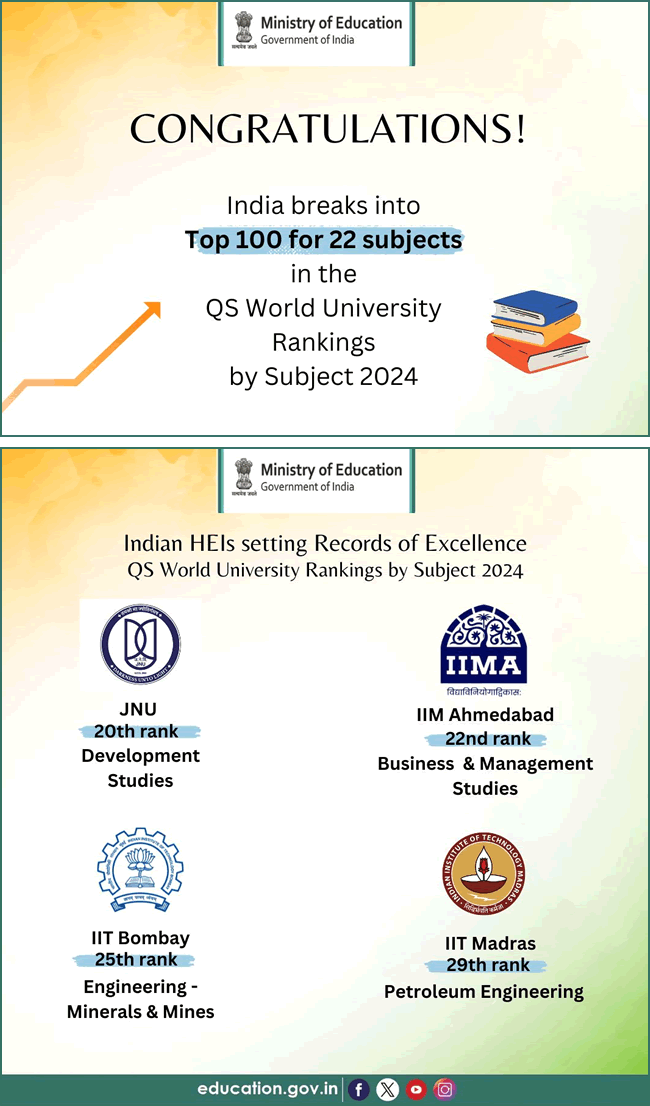
From India, 69 universities, with 424 entries, have made it to the QS World University Rankings by Subject. IIM-Ahmedabad is among the top 25 globally for Business and Management Studies, while IIM-Bangalore and IIM-Calcutta are among the top 50. Jawaharlal Nehru University is ranked 20th globally for Development Studies. The University of Delhi, IIT Bombay, and IIT Kharagpur are most represented, with 30, 28, and 27 entries, respectively.
Source: QS Quacquarelli Symonds
|GlobalGiants.Com|
Edited & Posted by the Editor | 1:26 PM | View the original post
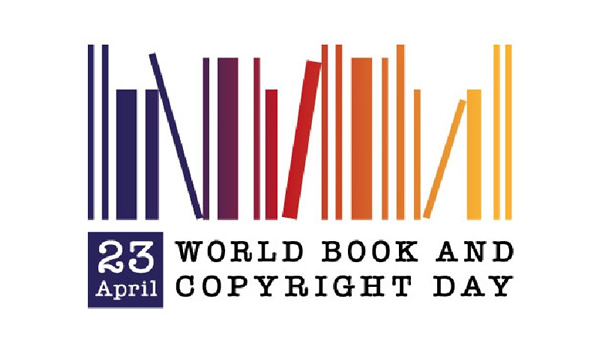
Every year, the Advisory Committee for World Book Capital recommends to the Director-General of UNESCO the Name of the City that deserves to be designated as World Book Capital for one year, starting from April 23, celebrated as World Book and Copyright Day.
The Advisory Committee includes prominent organizations such as the International Authors Forum, the European and International Booksellers Federation, the International Federation of Library Associations and Institutions, and the International Publishers Association, alongside UNESCO.
Recently, Strasbourg, France, was designated the World Book Capital for 2024, while Rio de Janeiro, Brazil, will hold the title in 2025.
A city designated as UNESCO World Book Capital must promote books and reading across national borders and organize activities for all ages and groups.
• World Book Capitals
UNESCO has now opened nominations for the World Book Capital 2026, inviting City Administrations and Municipal Corporations worldwide to submit their applications.
To ensure your nomination gets considered, please submit all applications in English or French by May 10, 2024.
In India, the Indian National Commission for Cooperation with UNESCO, Department of Higher Education, Ministry of Education, Government of India, has announced UNESCO’s Call for nominations for the 2026 World Book Capital.
The Commission recommends that the City Administrations or Municipal Corporations send their applications to the National Book Trust, New Delhi, by April 15, 2024.
The National Book Trust will examine the applications and forward them to UNESCO Headquarters in Paris, France, for consideration.
Sources: UNESCO; Indian National Commission for Cooperation with UNESCO
|GlobalGiants.Com|
Edited & Posted by the Editor | 12:59 PM | View the original post
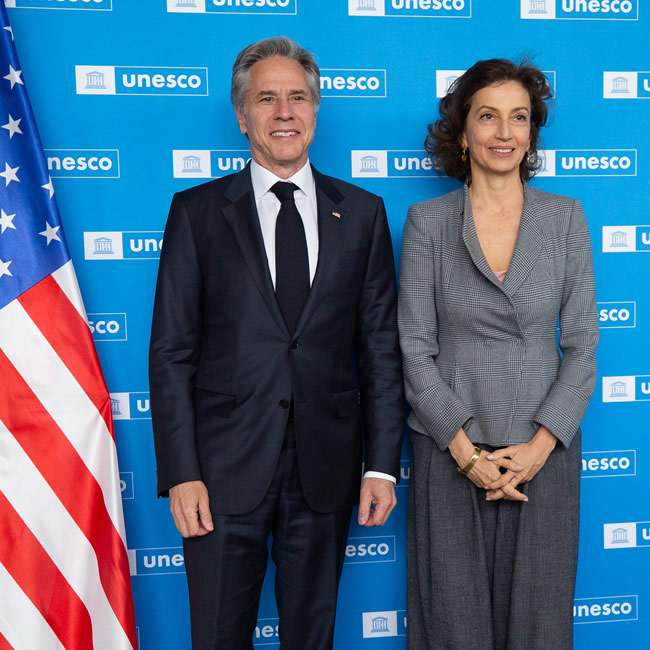

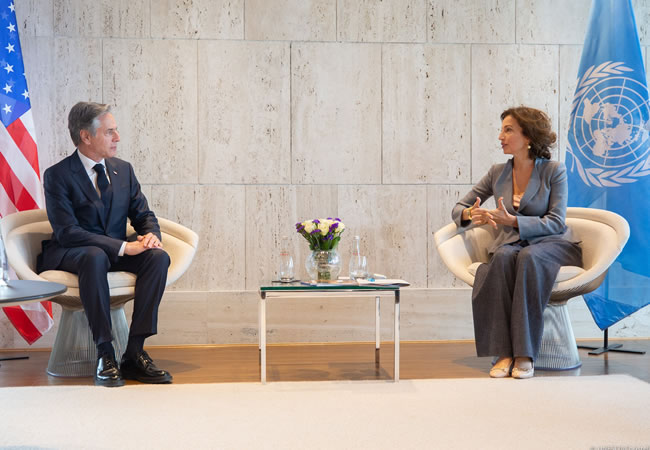
Photos: Audrey Azoulay, UNESCO’s director-general, met with US Secretary of State Antony Blinken at the Organization’s headquarters in Paris. During his visit, Blinken reaffirmed the United States’ enduring support for UNESCO’s fundamental mission, notably safeguarding culture and education. Images provided by UNESCO; copyright © UNESCO/Christelle ALIX.
Paris, France, April 06, 2024 — US Secretary of State Antony Blinken made his first official visit to UNESCO headquarters since the United States re-joined the Organization in July 2023. In a meeting with Audrey Azoulay, he reaffirmed the United States’ total commitment to supporting UNESCO’s mandate for education, sciences, culture, and information.
The Director-General praised the United States’ commitment to the Organization’s multisector priorities, including gender equality, improving access to quality education for all, and globally implementing the Recommendation on the Ethics of Artificial Intelligence, which UNESCO’s Member States unanimously adopted in November 2021.
Audrey Azoulay and Antony Blinken also discussed actions that UNESCO implements in crisis and conflict environments, notably Iraq, Gaza, and Ukraine.
The United Nations Educational, Scientific and Cultural Organization (UNESCO) is comprised of 194 Member States and has its headquarters in Paris. It leads international cooperation in education, science, culture, communication, and information. UNESCO oversees over 2000 World Heritage sites, Biosphere Reserves, and Global Geoparks. Additionally, it manages networks of Creative, Learning, Inclusive, and Sustainable Cities. Further, it operates over 13,000 associated schools, university chairs, training academies, and research institutions.
Source: UNESCO
|GlobalGiants.Com|
Edited & Posted by the Editor | 2:52 AM | View the original post
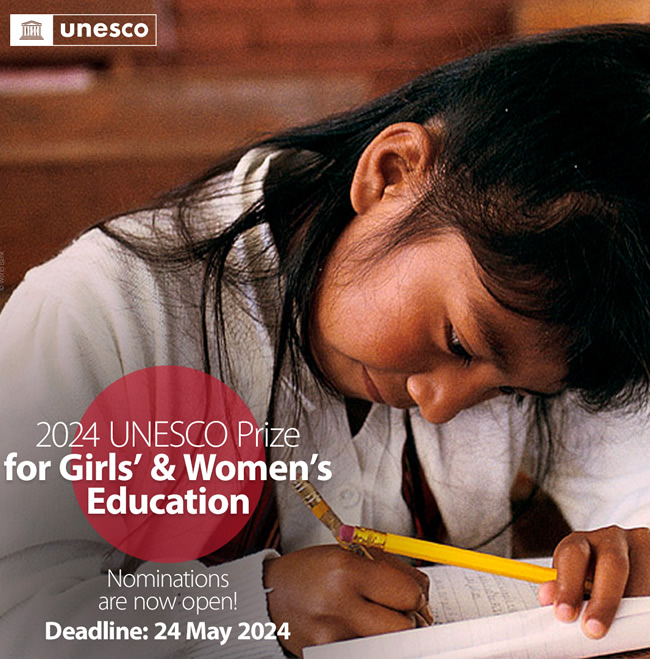
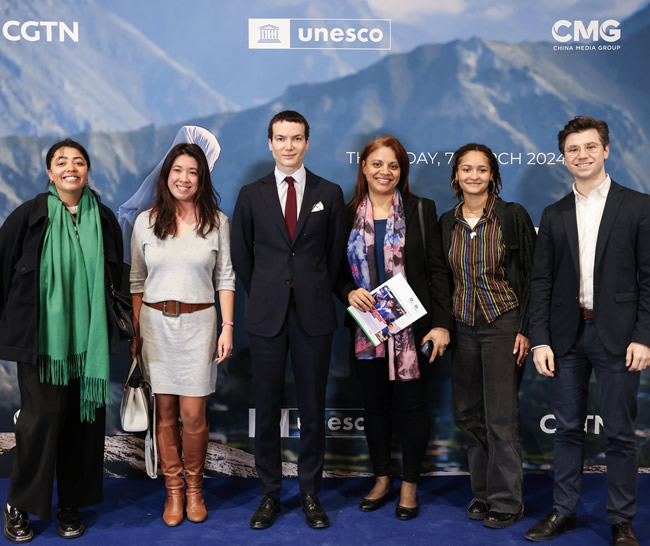
Photo: A group of participants at a meet on Education for Women. UNESCO Headquarters, Paris. March 7, 2024. Image provided by & copyright © UNESCO/Marie ETCHEGOYEN.
Paris, France, March 30, 2024 — On International Women’s Day, UNESCO launched the Call for Nominations for the 2024 UNESCO Prize for Girls and Women’s Education. The Prize awards US$50,000 annually to two laureates who make outstanding efforts toward girls’ and women’s education.
At the Transforming Education Summit in 2022, countries called for actions that put gender equality at the heart of education plans, budgets, and policies as part of their commitment to transforming education for the world we live in today.
It means promoting gender equality in curricula and pedagogies, creating safe, inclusive, and transformative learning spaces, supporting collaboration across sectors and generations, and investing in the most marginalized.
The Governments of UNESCO Member States can make the nominations. They can nominate up to three individuals, institutions, or organizations who have made solid and innovative contributions to girls’ and women’s education.
Interested candidates should contact their country’s National Commission for UNESCO, Permanent Delegation to UNESCO, or the Prize Secretariat for more information.
Nominations must meet the eligibility and selection criteria set by the Prize. Nominated projects must have been established and running for at least two years, showing potential for replicable and scalable growth.
An independent International Jury of five experts will assess nominations based on the project’s impact, innovation, and sustainability prospects.
Based on the jury’s recommendations, the Director-General of UNESCO will announce the 2024 laureates, who will receive the award on or around October 11, 2024, as part of the International Day of the Girl celebrations.
The submission deadline is May 24, 2024 (midnight, Paris time).
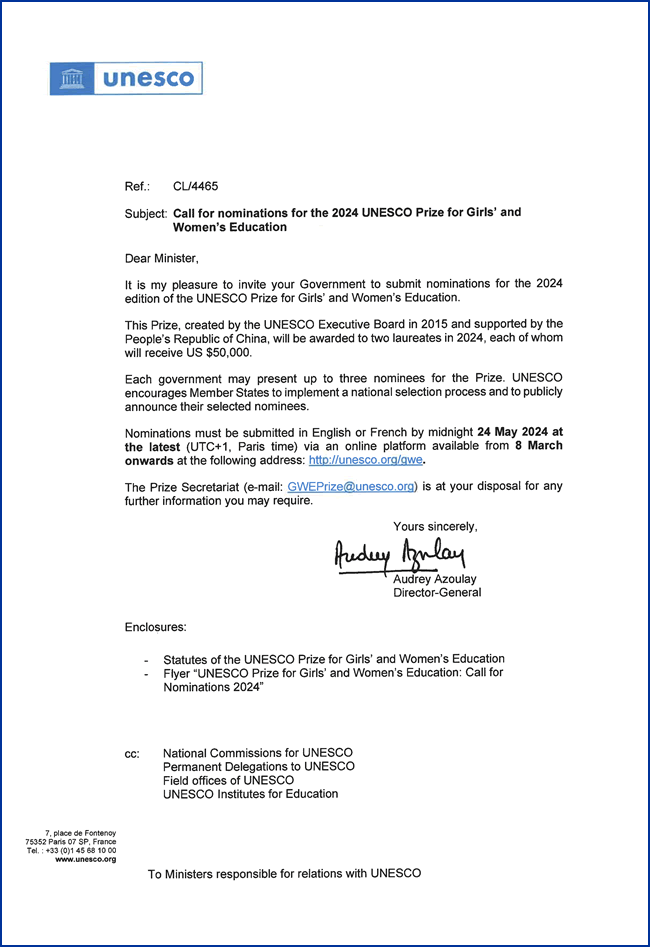
Photo: UNESCO Director-General’s letter to the Education Ministers of all Unesco Member Countries inviting Nominations for the UNESCO Prize for Girls and Women’s Education.
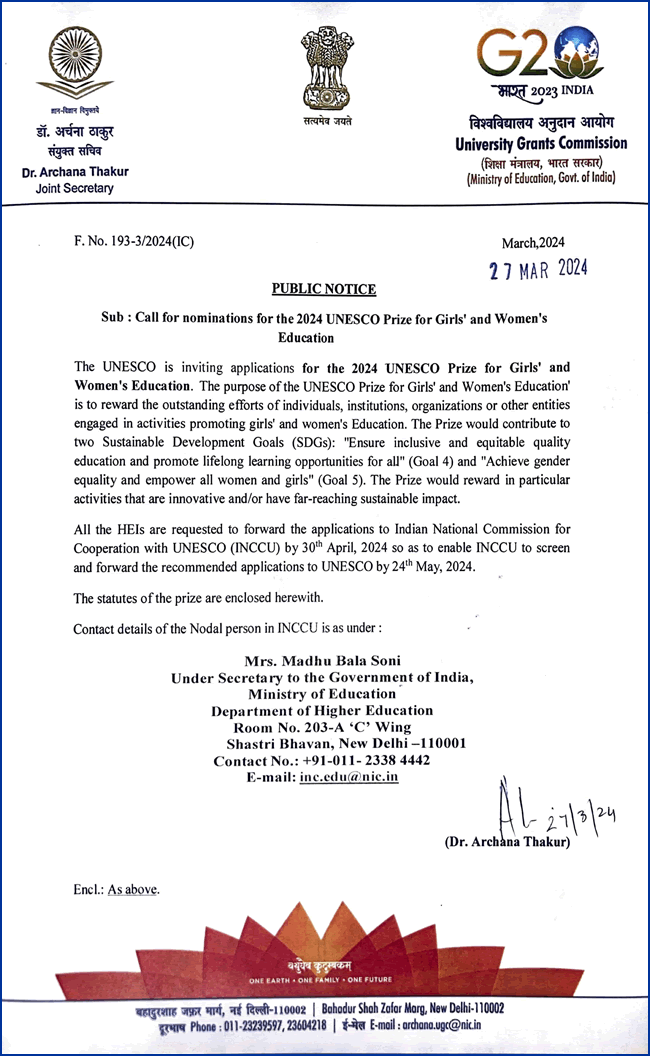
Photo: The University Grants Commission (UGC) India Public Notice announcing UNESCO’s Call for Nominations for the 2024 Girls and Women’s Education Prize. The UGC has advised all Higher Education Institutions to submit their nomination applications to the Indian National Commission for Cooperation with UNESCO (INCCU) by April 30, 2024. INCCU will then screen and forward the recommended nominations to UNESCO.
(The Indian National Commission for Cooperation with UNESCO (INCCU) is a part of the International Cooperation Cell within the Department of Higher Education, Ministry of Education, Government of India. The Minister of Education serves as the President of the Commission. The Secretary to the Government of India in the Department of Higher Education, Ministry of Education, acts as the Secretary-General of the Commission and is responsible for overseeing the work of the Commission.)
Sources: UNESCO; Department of Higher Education, Ministry of Education, Government of India.
|GlobalGiants.Com|
— The Editor is a UNESCO-IIEP-Certified Education Planning Consultant.
Edited & Posted by the Editor | 12:55 AM | View the original post


New Delhi, India, March 24, 2024 — The University Grants Commission (UGC) has issued a Public Notice instructing the Public and students to check a university’s relevant status before enrolling in its open and distance learning (ODL) and online learning (OL) programs.
The University Grants Commission (UGC) has established regulations that set minimum standards of instruction for granting degrees and diplomas in ODL and Online mode. To ensure a positive learning experience, students should confirm the recognition status of the Higher Education Institution (HEI) offering ODL and Online education, check for prohibited programs and franchising arrangements, and ensure that the University conducts all activities or ODL programs within its territorial jurisdiction.
• Determining the Relevant Status of a Higher Educational Institution (HEI):
Recognition Status of the HEI: The UGC’s Distance Education Bureau (DEB) website provides the year-wise and academic session-wise status of HEIs recognized to offer programs through Open and Distance Learning (ODL) and Online Learning (OL) modes.
Entitlement Status of the HEI: The UGC’s Distance Education Bureau (DEB) website provides the list of HEIs entitled to offer programs in ODL and Online modes, along with the names of the programs.
• Check the details on the HEIs’ website: All Higher Education Institutions (HEIs) recognized and entitled to offer Open and Distance Learning (ODL) and online programs are required to upload details including:
Students should thoroughly review the above information on their University’s Website.
• Further, the students must check which HEIs are prohibited from offering ODL or Online programs and are classified as ‘No Admission’ institutions.
• Additionally, students must ensure that the ODL and Online courses they enroll in strictly adhere to the UGC notification on Specification of Degrees, 2014, and its subsequent amendments regarding minimum duration, nomenclature, and entry-level qualifications.
• Conduct of Activities within the Territorial Jurisdiction of the University:
• The University Grants Commission (UGC) prohibits specific disciplines from being offered under Open and Distance Learning (ODL) and Online modes. These include Engineering, Medical, Physiotherapy, Occupational Therapy, Pharmacy, Nursing, Dental, Architecture, Law, Agriculture, Horticulture, Hotel Management, Catering Technology, Culinary Sciences, Aircraft Maintenance, Visual Arts, Sports, and Aviation. Additionally, the UGC prohibits M.Phil and Ph.D. programs from being offered in ODL and Online modes.
• March 31, 2024, is the last date for admissions to all HEIs for ODL and Online Programmes for the academic sessions commencing February 2024.
Source: UGC
|GlobalGiants.Com|
Edited & Posted by the Editor | 2:04 AM | View the original post


New Delhi, India, March 20, 2024— The University Grants Commission (UGC) has informed the Vice-Chancellors of all Universities that the “Maternity Benefit Act, 2017” requires that all establishments with fifty or more employees provide a creche facility within a prescribed distance. The creche facility can be provided separately or along with shared facilities. Further, the Ministry of Women and Child Development (MWCD) has developed the National Guidelines for Setting Up and Running Creches under the “Maternity Benefit Act 2017.”
The UGC has asked all Higher Educational Institutions to adhere to the National Minimum Standards and Protocol for Creches (Operation and Management) outlined by the Ministry of Women and Child Development (MWCD). The UGC has also urged the Universities to inform their affiliated colleges of this requirement and ensure compliance.
• Universities and colleges must prioritize the well-being of their staff and students, focusing on new mothers within their community. Academic institutions are responsible for providing adequate support and resources for new mothers to help them balance their educational and family commitments.
Source: UGC
|GlobalGiants.Com|
• To support the academic aspirations of women, working parents, scholars, and students, the University Grants Commission (UGC) introduced a scheme a few years ago to provide daycare facilities for infants at universities on a payment basis. This initiative was a valuable resource for University employees and students away during the day. It gave them peace of mind that their infants were cared for in a safe and reliable environment. The scheme was also available to male employees, scholars, and students whose wives were working elsewhere. The UGC has discontinued this scheme.

Photo: The format for submitting a proposal for a daycare center (for information only). Eligible universities could submit an application outlining their need for the facility. Once accepted, the UGC released the permissible amount. This scheme is no longer available.
Edited & Posted by the Editor | 2:34 AM | View the original post
— Clusters of higher education institutions will use the Noodle Learning Platform, which empowers universities to deliver online course offerings through a fully customizable platform.
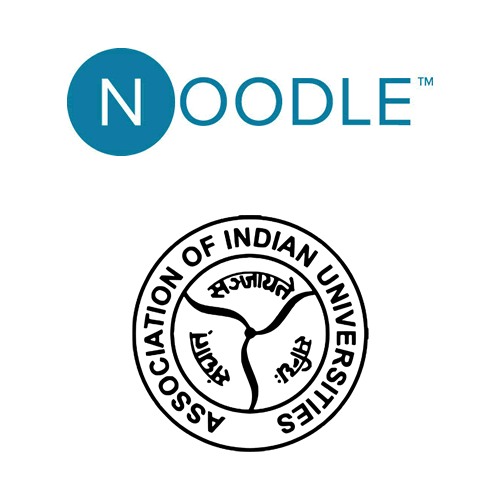
NEW YORK, March 20, 2024 — The Association of Indian Universities (AIU) located in New Delhi, India, and Edify Online Corp (EdifyOnline) based in Birmingham, USA, have partnered with Noodle (Noodle), a technology company in New York, USA, to develop a shared ecosystem of lectures by global academic leaders and professors. This program will benefit the AIU’s 992 member universities, which serve over 5 million students. The Noodle Learning Platform (NLP) will be provided by Noodle, allowing universities to offer online courses through a fully customizable, LMS-agnostic all-in-one platform. The partners will work together to address the challenges, successes, and opportunities of implementing the program. Industry experts will review and publish the results to benefit all AIU members.
“With the help of EdifyOnline and Noodle’s NLP, AIU is preparing to enable a ‘shared HEIs ecosystem’ for AIU member universities to provide highly qualified and highly skilled international academic leaders at scalable and sustainable costs, as well as build bridges for Indian faculty to do the same for international HEIs in future,” said Secretary General of the AIU, Dr. Pankaj (Mrs.) Mittal.
Anil P. Agarwal, Co-Founder of EdifyOnline, believes that the Shared HEIs ecosystem is the future of higher education. It improves education standards and opportunities for all academic faculties, including those in India. Their mission is to ensure that everyone has the right to be enlightened, which supports the central theme of the Indian National Education Policy 2020. Agarwal is confident that their collaborative efforts with Noodle, AIU, and AIU member HEIs are timely, affordable, and synergistic.
“Our platform helps universities offer low-cost, high-quality education globally. Noodle empowers universities to transform the world with accessible and innovative education,” said John Katzman, Noodle’s CEO.
Dr. Amarendra Pani, the Joint Director and Director of the Research Division of AIU believes that the “University Clusters Pilot Study” in India will provide international exposure to students. The study will enable an ecosystem of shared lectures using international talent, triggering innovative ideas and processes leading to advanced research in higher education. He added that he and his research staff are looking forward to working with all stakeholders, including AIU member universities, to ensure the success of this pioneering initiative.
The Association of Indian Universities, founded in 1925, is India’s leading representative body for universities and higher education institutions. AIU membership comprises all types of universities, including conventional universities, open universities, deemed-to-be universities, state universities, central universities, private universities, and institutes of national importance. As of now, there are 992 university members of the AIU.
EdifyOnline provides a platform, EdifyProfessional®, where Higher Education Institutions (HEIs) can hire independent contractors for various academic roles such as instructors, guest lecturers, course content creators, professional development, and other specialized areas. The platform showcases highly qualified subject experts from around the globe. It is ideal for HEIs struggling with a lack of competent academic talent or seeking to expand their international competencies.
Noodle is a tech-enabled partner for higher education. As a Certified B Corporation, it helps academic institutions grow their online enrollments and build infrastructure. Noodle offers strategic consulting, customized services, and technology integration to make partners more efficient and responsive.
Source: Noodle
|GlobalGiants.Com|
Edited & Posted by the Editor | 6:19 AM | View the original post
UPDATE
MARCH 14, 2024
UGC has published a Public Notice and released an updated list of Defaulting Universities that have still not appointed Ombudspersons in compliance with the University Grants Commission (Redressal of Grievances of Students) Regulations, 2023.
• Updated List of Defaulting State Universities as of March 12, 2024.

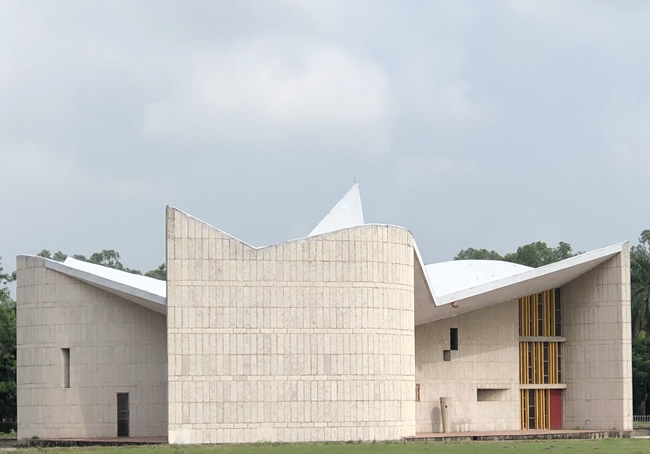
Photo: Gandhi Bhawan, Panjab University Chandigarh (Photo for Representation).
MANDATORY
• Each University must appoint an Ombudsperson to address the grievances of students enrolled in the University and affiliated colleges/institutions.
UNIVERSITY’S PENCHANT FOR HARASSING & VICTIMIZING
• The grievances include non-transparent or unfair evaluation practices and the University’s penchant for harassing and victimizing students.
MUST DISPLAY OMBUDSPERSON DETAILS
• Per the UGC regulations, each University and its affiliated colleges must display the particulars and contact details of the Ombudsperson and students’ grievance redressal committee (SGRC) on their websites and at prominent places on their campuses.
CONSEQUENCES OF NON-COMPLIANCE
• If an institution willfully contravenes these regulations, the UGC will take one or more of the following actions:
Withdrawing declaration of fitness to receive grants under section 12B of the UGC Act.
Withholding any grant allocated to the Institution.
Declaring the Institution ineligible for consideration for any assistance under any of the Commission’s general or special assistance programs.
Declaring the Institution ineligible to offer courses through Online/ODL mode for a specified period.
Withdrawing/withholding/suspending the approval for offering courses through Online/ODL mode.
Informing the general public, including potential candidates for admission, through a notice displayed prominently in suitable media and posted on the Commission’s website, declaring that the Institution does not possess the minimum standards for redressal of grievances.
Recommending the State Government to take necessary and appropriate action if a University is established or incorporated under a State Act.
New Delhi, India, January 31, 2023 — On April 11, 2023, UGC notified the University Grants Commission (Redressal of Grievances of Students) Regulations, 2023, in the Official Gazette of India. Following this, the UGC sent a letter to the University Vice-Chancellors asking them to appoint ombudspersons within 30 days.
The UGC again wrote to the Vice-Chancellors of all Universities and asked them to implement the University Grants Commission (Redressal of Grievances of Students) Regulations, 2023, and appoint Ombudspersons on or before December 31, 2023.
The UGC told the universities that they must comply with the Regulations, and if a university continues to be non-compliant, the UGC will take punitive action against it.
On January 17, 2024, the UGC released a “Public Notice” listing the “Defaulting Universities” that have failed to appoint Ombudspersons.
The list contained the names of more than 200 Universities that defaulted on appointing Ombudspersons per the regulations.
In its January 17, 2024, “Public Notice,” the UGC directed that those universities who appoint Ombudsperson (s) subsequently may communicate it to the UGC so that it may remove their name from the “Defaulters” list.
Meanwhile, Panjab University at Chandigarh has fully complied with the UGC directive on the University Grants Commission (Redressal of Grievances of Students) Regulations, 2023. It has constituted a Student Grievances Redressal Committee (SGRC) and has duly appointed an Ombudsperson.
Thus, it has averted getting branded a “Defaulter” by the UGC. Consequently, the name of Panjab University Chandigarh does not appear on UGC’s “Defaulting Universities” list.
However, per the directives of the UGC, Panjab University and its affiliated colleges must prominently display the contact details of the Student Grievances Redressal Committee (SGRC) and the Ombudsperson on their campuses.
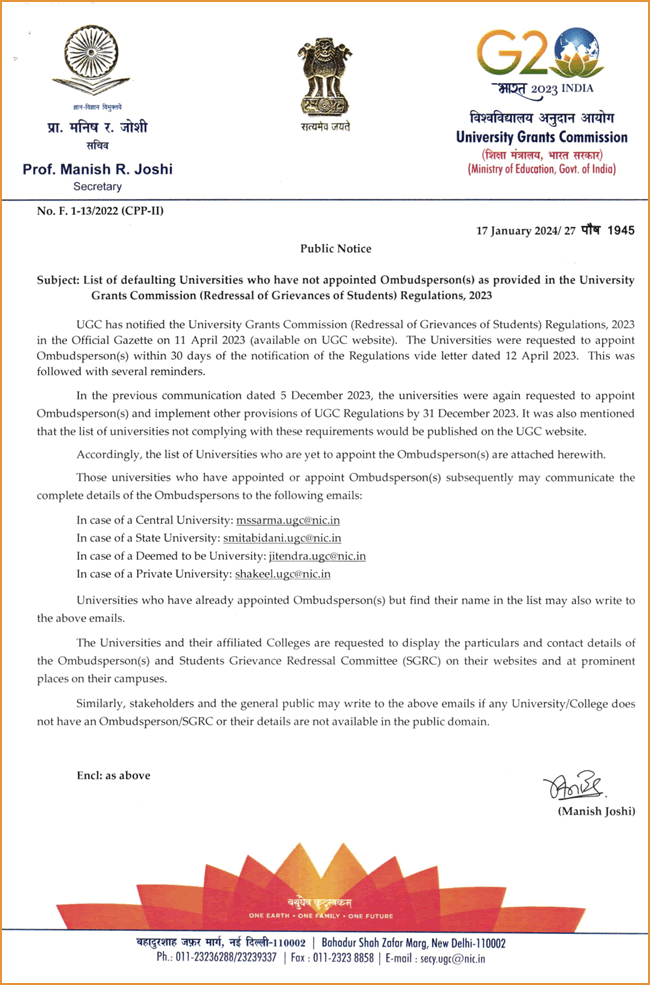
Photo: UGC Public Notice announcing the List of Defaulting Universities that have not appointed Ombudspersons in compliance with the University Grants Commission Redressal of Grievances of Students Regulations, 2023.
Source: UGC
|GlobalGiants.Com|
Edited & Posted by the Editor | 5:14 AM | View the original post
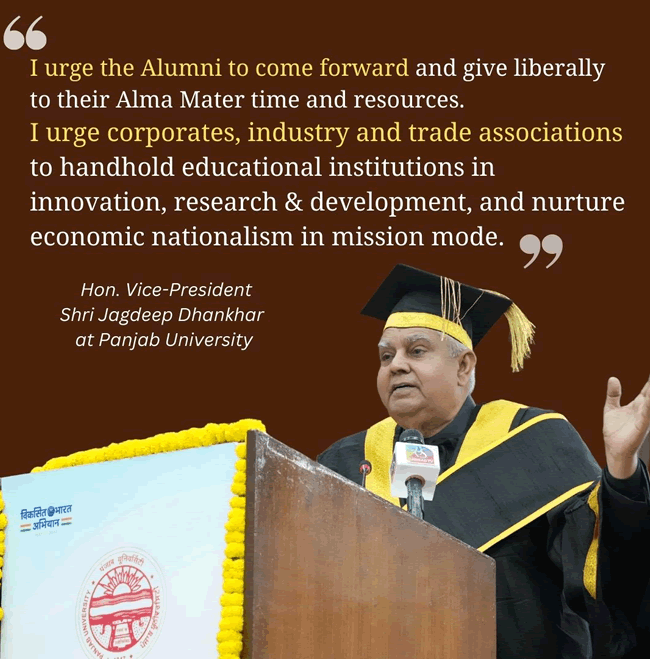
Chandigarh, India, March 07, 2024 — The Vice-President of India, Jagdeep Dhankhar, who is the ex-officio Chancellor of the institution, addressed the 71st Convocation of Panjab University in Chandigarh today.
The Vice President stated that the IMF has recognized India as a bright spot for investment and opportunity. Additionally, the World Economic Forum is optimistic about India’s development and expects it to become a developed nation by 2047.
The Vice-President emphasized the importance of universities in exposing students to new areas of study, such as disruptive technology, and breaking down the silos that prioritize cutthroat competition for government jobs. Shri Dhankhar also highlighted the need for balance in understanding the advantages and disadvantages of competition.
The Vice-President acknowledged that a university’s strength largely depends on its faculty and alumni. Therefore, he appealed to alumni to contribute to the growth of their Alma Mater. He further noted that alumni and corporations play a crucial role in developing educational institutions in developed nations.
He urged corporates to support educational institutions in India to promote innovation, research, and development. According to him, universities should serve as a platform for confronting ideas rather than just being a sanctuary for comfort.
Source: Vice President’s Secretariat
— Ayushmann Khurrana and Neeraj Chopra, Ratna Awardees of the University, were supposed to attend the Convocation as special guests but couldn’t make it.
|GlobalGiants.Com|
— The editor holds IMF Washington DC’s Academic Certificate in Financial Market Analysis.
Edited & Posted by the Editor | 10:13 PM | View the original post
 |
 |
